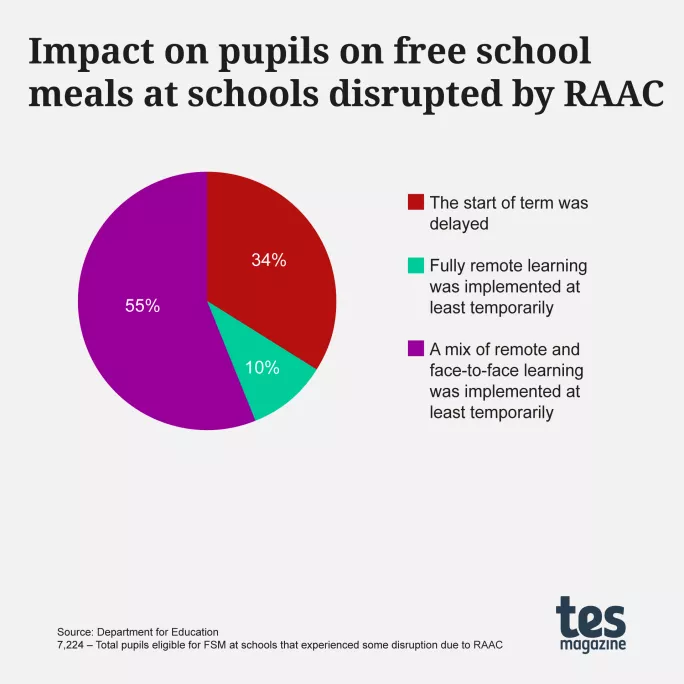Concern for 7,000 pupils on FSM at RAAC-hit schools

There is concern for the more than 7,000 disadvantaged pupils identified by Tes as attending schools disrupted by reinforced autoclaved aerated concrete (RAAC) this term.
School leaders’ unions are calling on the government to ensure these pupils are not “doubly disadvantaged”, and say guidance is needed on how special considerations might be applied for exam students.
Of the 174 schools confirmed to have RAAC so far, 46 either had to delay the start of term or move at least some learning online when pupils first returned.
There are 7,224 pupils eligible for free school meals (FSM) across those schools where RAAC has had an impact on the amount of face-to-face learning, according to a Tes analysis.
Of those, 2,482 pupils eligible for FSM saw the start of their term delayed, 3,985 have been in schools with a mix of remote and face-to-face learning, and 757 are at schools that had to move to fully remote learning, at least temporarily.
- RAAC in schools: Key legal obligations explained
- 174 schools now confirmed to have RAAC
- RAAC: Schools need ‘urgent clarity’ over funding as costs mount
Geoff Barton, general secretary of the Association of School and College Leaders, said there was a “particular concern” over the impact of RAAC on children in “already challenging circumstances”, such as those from disadvantaged backgrounds and with special educational needs or disabilities (SEND).
He said: “Despite the best efforts of schools affected by RAAC, there may be an adverse impact on the learning of some pupils because of the disruption caused by this issue.”
It was important, he added, that the Department for Education works with affected schools on what “additional support it can provide”, and where pupils are taking public examinations, “there needs to be clear guidance about how the special consideration process might be applied”, he said.
The analysis of DfE data comes after shadow education secretary Bridget Phillipson asked the government in September to publish a breakdown of pupils eligible for FSM at schools with RAAC.
Answering, children’s minister David Johnston said the information was available through existing datasets. However, it was unavailable in the requested format without analysing different data sources as Tes has done.
Significant disruption due to RAAC
Several schools on the RAAC list have more than half of pupils on free school meals - for example, Ark Boulton Academy in Birmingham, which had to delay the start of term, and Aston Manor Academy, also in Birmingham, which used a mixture of face-to-face and remote arrangements.
The start of term was also delayed at Kingsdown, a special school in Essex for pupils with severe and profound multiple learning difficulties, 48 per cent of whom are on FSM.
Rebecca Montacute, head of research and policy at the Sutton Trust, said: “Of the pupils affected, it’s likely to be disadvantaged kids who will need the most support, particularly with catching up on any lost learning as a result of this disruption, or with access to appropriate devices for any remote learning that’s required.”

St Leonard’s Catholic School, a secondary in Durham, where just over one in 10 pupils are on FSM, has seen significant disruption due to RAAC, with all pupils starting the term remotely and the school now using a mix of remote and face-to-face learning.
The Bishop Wilkinson Catholic Education Trust, which runs the school, has asked if centre-assessed grades will be considered for GCSE and A-level students impacted, like during the pandemic.
St Leonard’s has now managed to find alternative spaces, but it could be six weeks before it gets temporary classrooms, and the school does not know when it will get replacement science labs.
Bishop Wilkinson’s CEO Nick Hurn told Tes: “The children have been badly affected at the start of the year. That needs to be recognised in some way because it would be wholly unfair if it wasn’t.”
He added: “There will be an impact across the board. I’m really worried about disadvantaged students because of the disruption to routines and face-to-face study and being in an environment where they’re comfortable is big - it’s very difficult to get any continuity.”
Some schools that saw disruption at the start of term have since managed to return to full face-to-face arrangements once mitigations or temporary classrooms were put in place.
The DfE has promised to fund all “reasonable” revenue costs relating to RAAC and all costs for putting mitigations in place.
Impact on pupils
Paul Whiteman, general secretary of the NAHT school leaders’ union, said there would “inevitably” be an impact on pupils forced to learn online or in “temporary and unfamiliar surroundings” due to RAAC.
He added: “Obviously, any disruption is a cause for concern, but we are especially worried for certain groups of pupils, including those with SEND or from disadvantaged backgrounds.
“It’s crucial the government acts swiftly to minimise the impact on all pupils and particularly to ensure that children from poorer backgrounds or with additional needs are not doubly disadvantaged.”
At the Commons Education Select Committee session on RAAC in September, MP Mark Francois asked the DfE how it would respond to “endless interruptions” to the education of pupils who had faced RAAC and Covid-19.
Baroness Barran said the department was speaking to exams regulator Ofqual about “how very significant disruption for some students might be taken into account”.
The DfE has been contacted for comment.
You need a Tes subscription to read this article
Subscribe now to read this article and get other subscriber-only content:
- Unlimited access to all Tes magazine content
- Exclusive subscriber-only stories
- Award-winning email newsletters
Already a subscriber? Log in
You need a subscription to read this article
Subscribe now to read this article and get other subscriber-only content, including:
- Unlimited access to all Tes magazine content
- Exclusive subscriber-only stories
- Award-winning email newsletters



